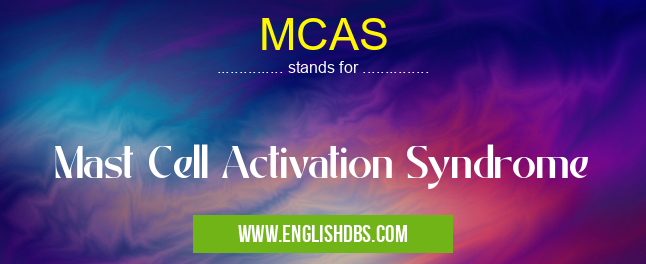What does MCAS mean in CARDIOLOGY
Mast Cell Activation Syndrome (MCAS) is a condition in which mast cells abnormally respond to certain triggers in the environment, releasing chemicals that cause an allergic reaction. The signs and symptoms of MCAS vary from person to person and can be severe.

MCAS meaning in Cardiology in Medical
MCAS mostly used in an acronym Cardiology in Category Medical that means Mast Cell Activation Syndrome
Shorthand: MCAS,
Full Form: Mast Cell Activation Syndrome
For more information of "Mast Cell Activation Syndrome", see the section below.
» Medical » Cardiology
Essential Questions and Answers on Mast Cell Activation Syndrome in "MEDICAL»CARDIOLOGY"
What are mast cells?
Mast cells are an important part of the immune system and play a role in inflammation and allergic reactions. They are located throughout the body, including the skin, nasal cavities, gastrointestinal tract, lungs, reproductive organs, urinary tract, eyes and nose. When these cells become activated they release many different substances into the bloodstream causing an inflammatory response.
What causes MCAS?
The exact cause of MCAS is unknown but it is believed to be triggered by one or more environmental factors such as food allergies, chemical sensitivities and stress. It may also be caused by a genetic mutation resulting in an overproduction of mast cells.
What are the signs and symptoms of MCAS?
Signs and symptoms can vary widely but typically include skin rashes or hives; abdominal pain; nausea; diarrhea; headaches; fatigue; wheezing or shortness of breath; dizziness or lightheadedness; coughing; itching; flushing or feeling hot; difficulty concentrating. Other less common symptoms may include joint pain or swelling, chest tightness and difficulty swallowing.
How is MCAS diagnosed?
Diagnosis may require a combination of methods including patient history taking, physical exam findings and laboratory testing. Additional tests such as skin biopsies and imaging studies may also be performed to rule out other conditions with similar symptoms. Additionally, doctors may prescribe medications such as antihistamines or allergy medications to help manage some symptoms associated with MCAS.
Are there any treatments for MCAS?
While there is no cure forMCAS currently available, treatment focuses on controlling the underlying environmental triggers when possible (by avoiding foods that trigger reactions if food allergies exist), minimizing exposure to irritants that trigger flare-ups (avoiding perfumes/chemicals), using antihistamines and other medications to reduce inflammation/symptoms (such as corticosteroids), using allergen immunotherapy shotsto gradually build up immunity against specific allergens when needed.
Final Words:
MCAS is a complex condition that requires accurate diagnosis from experienced medical professionals to determine best treatment plan for managing associated symptoms long term. While there is no cure for this condition yet lifestyle modifications such as exercise and dietary changes can help reduce certain triggers that can exacerbate symptoms related to this condition.
MCAS also stands for: |
|
| All stands for MCAS |
